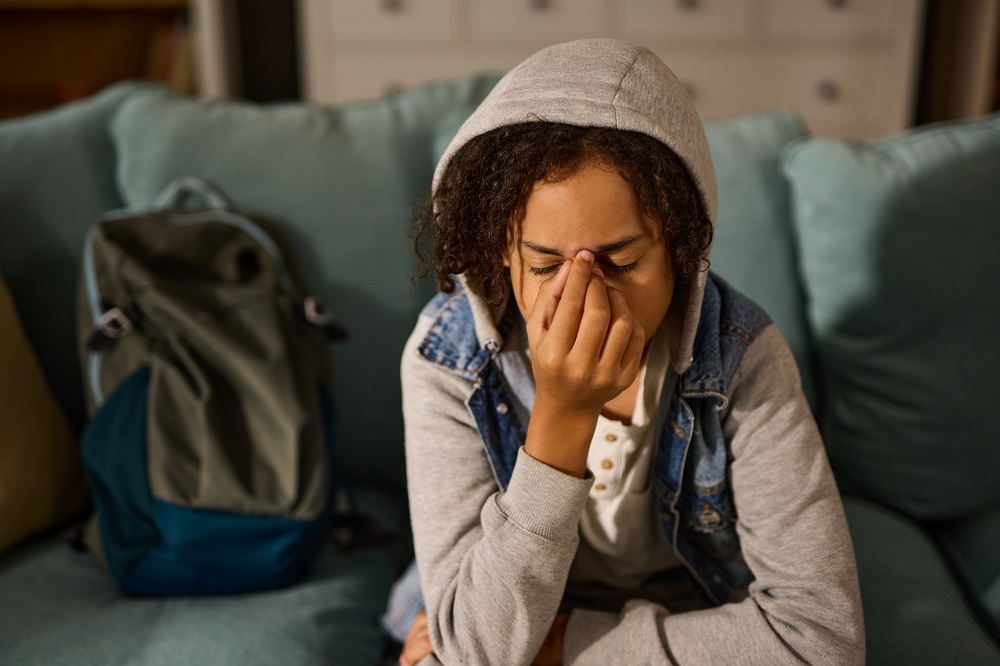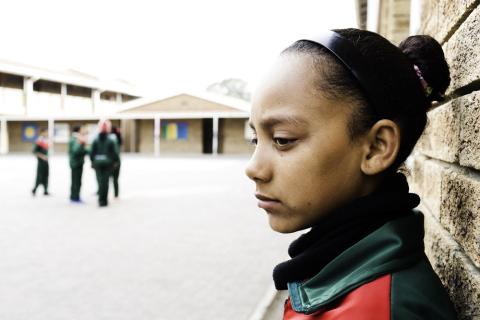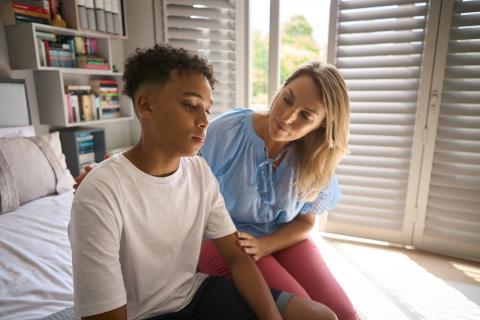It’s very important to teens to feel as if they belong. But sometimes they might find themselves pressured into situations they’re not comfortable with, just to fit in or to be accepted and liked. Or they may become friends with someone who doesn’t have their best interests at heart.
What is peer pressure?
Peer pressure is when your teen feels pushed into doing something by their friends that they wouldn’t usually do, so they fit in.
Finding new interests and experimenting with different styles are all a natural part of growing up. So just because your teen decides that from now on they’re only going to wear black or they’re suddenly passionate about skateboarding, this doesn’t mean they’re being pressured into it.
Young people love to feel like they belong, and in some cases peer pressure can be a positive thing – for example, if your teen joins a club or takes up a sport because their friends are into it.
But in some cases they may feel under pressure to do things that they’re not comfortable with, or that they know are probably a bad idea.
One thing to remember is that, although they may not admit it, you are still a big influence on your teen. So if you continue to let them know that you love them and that they can always come to you, any ‘bad’ influences from friends probably won’t have a lasting effect.
How to help your teen deal with peer pressure
It’s important to remind your teen that if their friends are making them feel uncomfortable or pushing them to do things they don’t want to do, they don’t have to stay friends with them. It’s much healthier to surround yourself with people who share your values and treat you with kindness and respect. You can find lots of tips for helping your teen meet people they have things in common with here.
However, if they’re feeling conflicted, there are several ways you can your teen stand up to peer pressure:
- Help them build their self-esteem and confidence, so they feel more able to stand up for themselves and say what they think.
- Help them practise saying no to things they don’t want to do.
- Work out an ‘escape plan’ with them so they can contact you quickly and easily if they ever feel pressured or unsafe (for example, they could text you a code word).
- Encourage them to make the most of social media, to help avoid feeling peer pressure online.
YoungMinds have some good advice for teens on dealing with peer pressure you could take a look at together.
Our section on risk-taking behaviour has lots of information and advice on how you can talk to them about things like vaping, smoking, alcohol and drugs.
What are unhealthy or toxic friendships?
In a happy, healthy friendship, friends trust, respect and look out for each other. They may annoy each other and fall out from time to time, but on the whole they make each other happy.
But not all friendships are like this. In some friendships, the balance of power can be uneven, so one friend has more control over the other (for example, they may lay down the law on what they wear or who they can spend time with). Friends like this may single your teen out for special attention one day so they feel on top of the world, then turn round and be mean to them the next day. They may also push them into doing things they don’t want to, or put them down and make them feel they’re not good enough.
Of course this isn’t a friendship at all, it’s bullying disguised as friendship, but your teen may not see it that way.
What to do if you're worried about your teen's friendships
If you’re concerned about your teen’s friendships, the first step is to chat to them about it. Try not to be judgmental, or to tell them not to see their friend again – this won’t help. Instead you could talk about what you’ve noticed. For example, you could say something like ‘You often seem down after you’ve seen Johnny’ or ‘You seem upset after Facetiming Annie – is anything wrong?’ You may be able to help them work out ways of standing up to their friend. For example they could practise:
- saying no to them if they’re pushing them to do things they’re not comfortable with
- explaining that they don’t need their advice if they’re telling them what to wear or how to behave
- saying that they don’t want to hang out with them when they’re treating them unkindly.
Be sensitive – your teen may not realise that the friendship is unhealthy, or they may feel ashamed or embarrassed that their ‘friend’ treats them so badly. So make sure they understand that they haven’t done anything wrong.
For more advice check out our pages on:
Where to get help and advice
If your teen is having ongoing problems with friends and it’s affecting their daily life, it may help for them to talk to their guidance teacher or counsellor at school. If they’d rather keep things anonymous, they could also consider contacting Childline or The Mix.
Younger teens can find also advice about friendships on the Childline website while older teens can find advice on the YoungMinds website.
If you have any concerns about your teen, our page on getting support when you’re raising a teen lists organisations that can help.
 Activities & Play
Activities & Play Behaviour
Behaviour Childcare
Childcare Development & Growing Up
Development & Growing Up Family, Friends & Relationships
Family, Friends & Relationships Feeding Your Baby
Feeding Your Baby Food & Eating
Food & Eating Health & Safety
Health & Safety Mental Health & Wellbeing
Mental Health & Wellbeing Money & Work
Money & Work Online Behaviour & Safety
Online Behaviour & Safety Pregnancy & First Days
Pregnancy & First Days School & Education
School & Education Sleep
Sleep








 Behaviour
Behaviour
 Mental Health & Wellbeing
Mental Health & Wellbeing